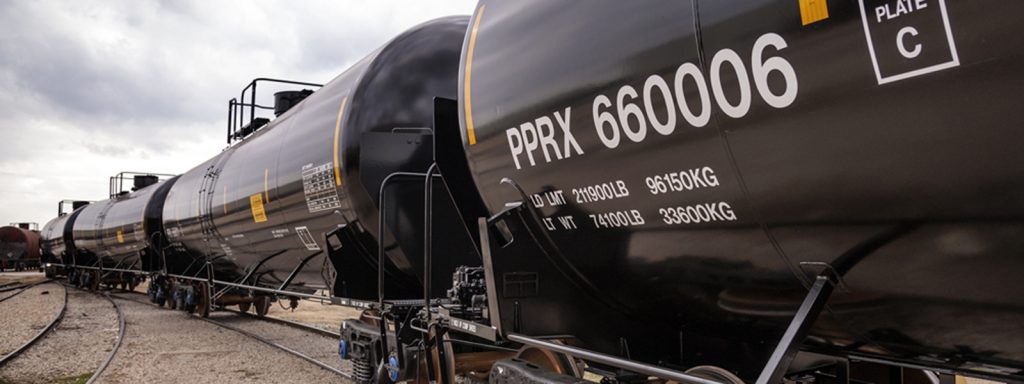Phillips 66 Dismisses Lawsuit Challenging Denial of Rail Spur Project
October 2, 2017
Environmental Groups Celebrate Final Victory in Protecting the California Coast from Dangerous Oil Trains
SAN LUIS OBISPO, Calif. – Environmental groups rejoiced as Phillips 66 agreed to dismiss its lawsuit challenging the denial of its proposed Rail Spur Project by the San Luis Obispo County Board of Supervisors. The dismissal means that the County’s denial stands, and Phillips will not be able to import heavy tar sands crude by rail car to its refinery near Nipomo in southern San Luis Obispo County. Phillips’ agreement to dismiss its lawsuit came as the company was facing a motion to dismiss from a coalition of environmental groups, as well as the County of San Luis Obispo, based on the fact that Phillips had failed to appeal the County’s denial to the California Coastal Commission.
 “The County’s denial of the Phillips oil train project will stand, and our coast and communities will be spared the risks of dangerous explosions and horrific rail accidents,” proclaimed Linda Krop, Chief Counsel for the Environmental Defense Center, which represented several of the groups involved in the litigation. “This victory is important for several reasons – for stopping dangerous oil trains, protecting coastal habitats, and upholding the integrity of the County’s extensive decision-making process.”
“The County’s denial of the Phillips oil train project will stand, and our coast and communities will be spared the risks of dangerous explosions and horrific rail accidents,” proclaimed Linda Krop, Chief Counsel for the Environmental Defense Center, which represented several of the groups involved in the litigation. “This victory is important for several reasons – for stopping dangerous oil trains, protecting coastal habitats, and upholding the integrity of the County’s extensive decision-making process.”
“This is a win for the citizens, environment, and economy of California,” said Andrew Christie, Director of the Sierra Club’s Santa Lucia Chapter. “In addition to removing the threat of all the well-documented hazards of this project, this decision thwarts the oil company’s attempt to avoid the legal protections for environmentally sensitive habitats, one of the central pillars of the California Coastal Act.”
“California’s environmental justice communities are disproportionately at risk from derailment or explosions of tank cars carrying explosive crude oil. The County’s rejection of this crude project goes a long way to addressing that risk, and we see it as a victory and a shining example for other decisionmakers who need to stand tall and say no to dangerous projects,” said Andres Soto, organizer for Communities for a Better Environment.
The San Luis Obispo County Board of Supervisors denied the project on March 29, 2017. Phillips then filed a lawsuit, alleging that the County had improperly determined that environmentally sensitive habitat areas (“ESHA”) existed on the project site. Impacts to ESHA were cited by the County as one of many reasons Phillips’ application was denied. Because the project is in the coastal zone, however, Phillips was required to appeal the County’s action to the Coastal Commission before resorting to court.
The County received comments and petitions from more than 25,000 Californians opposed to the Phillips Rail Spur project, and letters from more than 45 cities, counties, and school boards urging the County to deny the crude-by-rail proposal. If built, the Phillips 66 rail terminal would have allowed more than 7 million gallons of crude oil to be shipped via rail to its local refinery each week, and made it possible for Phillips 66 to refine volatile and carbon-intensive tar sands crude from Canada. Tar sands crude, when prepared for transport, is thinned with an unstable blend of chemicals that have been known to explode in derailment incidents, which have become increasingly frequent in recent years.
Trains servicing the Phillips 66 project would have traveled from the north and south through hundreds of major California cities and smaller communities, including Santa Barbara, Ventura, Los Angeles, Sacramento, Davis, Berkeley, Oakland, and San Jose. These trains also would have jeopardized numerous ecologically sensitive areas including the San Francisco Bay and California’s iconic central coast.
“This is a proud day for the thousands of Californians who stood up to Phillips 66 and said “NO” to its proposed crude oil train terminal in San Luis Obispo County,” said Charles Varni, STOP Climate Change Coordinator for San Luis Obispo Surfrider Foundation Chapter. He went on to add, “Across the western states we see grassroots movements challenging the fossil infrastructure and the last efforts of the fossil lobby to make more billions in profits regardless of harm to our health and planet. This victory is a symbol of what science based environmental impact analysis and enlightened citizen activism can accomplish.”
“From California to Washington, citizens along the West Coast are standing up to Big Oil’s reckless plans to endanger our communities with risky projects — and we’re winning,” said Ross Hammond, U.S. Campaigns Director at Stand.earth. “As the impacts of climate change are increasingly being felt locally, citizens are realizing that standing up to greedy fossil fuel companies must start at the local level, too. This is a huge victory for San Luis Obispo and the hundreds of communities along the rail line whose public health and safety would have been severely threatened by this increase in explosive oil trains traveling next to their homes, schools, and waterways.”
“Communities in San Luis Obispo and across California can rest easier knowing that Phillips 66 will not be allowed to put people and wildlife at risk from these dangerous oil trains,” said Andres Sheikh, Clean Energy Campaign Fellow at the Center for Biological Diversity. “This great outcome is a testament to the power of people standing up for what’s right, and putting public health and local communities ahead of pollution and profits.”





